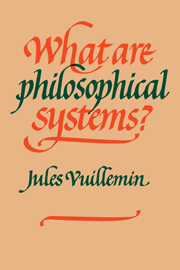Summary
In every discipline the order of exposition tends to reverse the order of inquiry.
I began my own inquiry about philosophical systems by reminding myself of what every historian of philosophy knows: namely, that philosophers are divided and that no part of the philosophical enterprise has ever been the object of common agreement. Neither Kant's critique of metaphysics nor the so-called ‘scientific method in philosophy’ has been successful in bringing peace, or even armistice, to the battlefield. Granting the truth of these statements, I had to seek the reason behind them by examining the nature and origin of philosophy. The systematic form of philosophy was elaborated to answer the ontological question posed by the advent of axiomatics when it jolted the unified world of myth, moulded as it was, by natural language. But all collective communication requires a formal recognition of the material that is perceived by means of the linguistic signs (what Saussure called the ‘signifier’). Thus, the question ‘How does language make the unity of the sensible world possible?’ came to be followed immediately by a question about the structure which is already given at the level of our animal perception.
In this essay my exposition reverses the order of my inquiry. The first chapter will deal with perceptual organization, and the second with language and the sensible world. In the third chapter I shall inquire into the nature and the systematic form of philosophy or rather of philosophies by analysing the relations that ontologies bear to axiomatics.
- Type
- Chapter
- Information
- What Are Philosophical Systems? , pp. vii - xPublisher: Cambridge University PressPrint publication year: 1986



